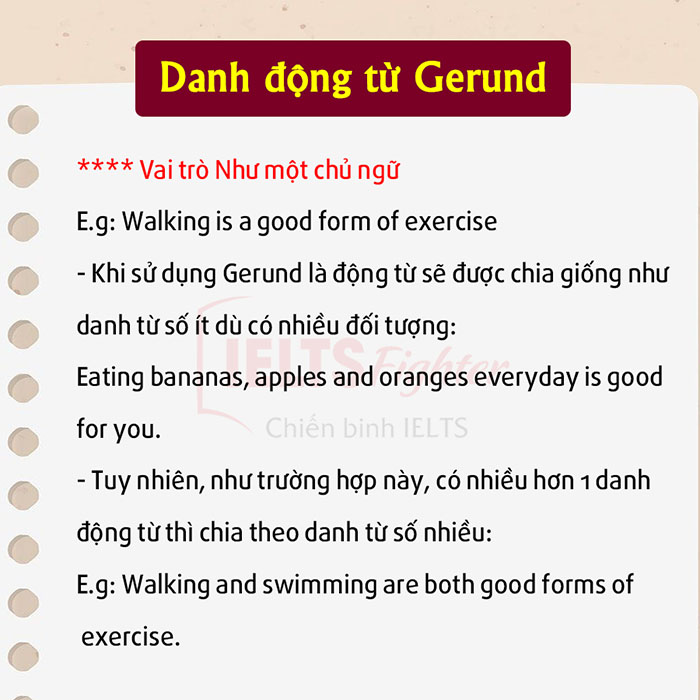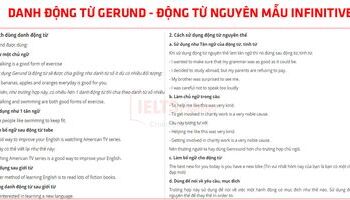Trong tiếng Anh, chúng ta đều biết có những từ đi kèm với Gerund – danh động từ và có những từ lại chỉ ở một dạng nguyên thể không chia? Hôm nay chúng ta cùng tìm hiểu kỹ hơn về danh động từ và động từ nguyên thể không chia nhé.
Đây là một dạng ngữ pháp quan trọng vì nếu có sự nhầm lẫn, bạn sẽ bị mất điểm.
Danh động từ Gerund
1. Khái niệm
- Là những danh từ được thêm đuôi ing phía sau và trở thành từ đóng vai trò như động từ.
Ký hiệu: V-ing
Lưu ý, V-ing ở đây không giống với chia động từ ở thì hiện tại tiếp diễn do đó cần chú ý để tránh nhầm lẫn.
Bạn xem chi tiết để hiểu rõ hơn về: Thì hiện tại tiếp diễn và cách sử dụng
- Khi sử dụng danh động từ theo thể phủ định thì thêm not ở phía trước:
Not exercising regularly is dangerous for your health.
- Để nói rõ về chủ thể thực hiện hành động thì bạn có thể thêm tính từ sở hữu trước đó:
E.g: My turning on the air conditioner
Đây là một đoạn văn ví dụ sử dụng nhiều danh động từ:
Learning vocabulary is very important for the IELTS test. Though it is important not to neglect the other skills of speaking, reading, writing and listening, knowing a broad range of words will help you with all the other parts of the test. Unfortunately, many students dislike spending the time that is needed to fully understand each word, but not taking vocabulary seriously could be a big mistake.
Bạn có đoán được những từ được chuyển thành danh động từ?
Chúng ta có:
- Learn – Learning
- Speak – Speaking
- Read – Reading
- Write – Writing
- Know – know
- Spend – Spending
- Take – Taking
Việc thêm đuôi ing sau các danh từ cũng tuân theo quy tắc: Nếu âm cuối là e thì bỏ đi và thêm ing.
2. Cách dùng danh động từ
Geround được dùng:
a. Như một chủ ngữ
E.g: Walking is a good form of exercise
Khi sử dụng Gerund là động từ sẽ được chia giống như danh từ số ít dù có nhiều đối tượng:
Eating bananas, apples and oranges everyday is good for you.
Tuy nhiên, như trường hợp này, có nhiều hơn 1 danh động từ thì chia theo danh từ số nhiều:
E.g: Walking and swimming are both good forms of exercise.

b. Sử dụng như 1 tân ngữ
- Some people like swimming to keep fit.
c. Làm bổ ngữ sau động từ tobe
- A good way to improve your English is watching American TV series.
Câu này có thể viết lại như thế này:
- Watching American TV series is a good way to improve your English.
d. Sử dụng sau giới từ
Another method of learning English is to read lots of fiction books.
e. Dùng danh động từ sau giới từ
- I am interested in learning a new language.
- There are many advantages of taking a sabbatical from work.
- I passed my exams without trying too hard.
- I'm worried about sitting for the IELTS test.
- I got a band 7 by studying very hard.
- I was shocked upon hearing the news.
- I'm sorry for talking so loud.
Như bạn thấy, sử dụng danh động từ cùng giới từ sẽ thường đi theo cụm kiểu collocations.
f. Trường hợp khác
Sử dụng nói về một hoạt động, với từ đi cùng là go.
E.g: I wanted to go jogging but my friend said he'd prefer to go swimming instead.
# Trường hợp quan trọng - danh động từ sử dụng sau động từ
Nếu bạn muốn sử dụng hai động từ đồng thời thì động từ phía sau sẽ là 1 danh động từ hoặc động từ nguyên thể.
Một ví dụ ở đây:
Bạn không thể nói thế này:
- We always finish eat very late.
- We always finish to eat very late.
Bạn cần một danh động từ phía sau để hoàn thành đúng yêu cầu.
Câu đúng là:
- We always finish eating very late.
Đây không phải là quy luật ngữ pháp mà bạn phải học thuộc các từ sẽ đi kèm với danh động từ và luyện tập thường xuyên.
Một số động từ sẽ theo sau là gerund nhưng cũng có một số từ theo sau là động từ nguyên thể, một số khác lại theo cả hai (phần 3). Vì thế bạn cần ghi nhớ kỹ.
Ví dụ:
- I like to swim (verb + infinitive)
Or
- I like swimming (verb + gerund)
Danh sách những động từ thường đi trước danh động từ
- Appreciate: Cảm kích
E.g: I appreciate you taking the time out to see me.
- Avoid: Tránh
E.g: You should avoid drinking sugary drinks.
- Consider: Cân nhắc
E.g: The government considered banning fox hunting.
- Delay: Trì hoãn
E.g: I delayed paying the fine for speeding.
- Deny: Phủ nhận
E.g: He denied committing the crime.
- Discuss: Thảo luận
E.g: We discussed sending the children to another school.
- Dislike: Không thích
E.g: Most people dislike getting up early.
- Enjoy: Thích
E.g: I enjoy having a day off.
- Finish: Kết thúc
E.g: We always finish eating very late.
- Involve: Đòi hỏi
E.g: My job involves moving around the country a lot.
- Miss: Nhớ (hoặc lỡ)
E.g: I miss seeing my family everyday.
- Postpone: Hoãn lại
E.g: We postponed marrying until we had the money.
- Practice: Luyện tập
E.g: He practiced hitting the ball against the wall.
- Quit: Bỏ
E.g: I will quit smoking next month.
- Recall: Gọi (hoặc nhớ lại)
E.g: I can't ever recall shouting at my children.
- Recommend: Khuyên
E.g: This book recommends studying for IELTS everyday.
- Resent: Bực tức
E.g: I resent my manager firing me from my job.
- Risk: Liều
E.g: I wouldn't risk taking IELTS before you are prepared.
- Stop: Dừng lại
E.g: If you stop worrying, you will perform better.
- Suggest: Đề nghị
E.g: She suggested studying in Australia.

Động từ nguyên mẫu V infinitie
1, Khái niệm
V-infinities hay còn gọi là động từ nguyên mẫu, động từ nguyên thể.
Có hai loại động từ nguyên mẫu là
- Thứ nhất với dạng từ gốc của động từ và đi trước là to. (to infinitives)
- Thứ hai là dạng không có to (Bare infinitives).
Ở đây người ta hay gọi động từ nguyên mẫu ám chỉ có to, nếu không có to người ta sẽ nói rõ là không có to.
Ví dụ về một đoạn văn sử dụng động từ nguyên mẫu:
To improve my IELTS score, I joined a writing class in a college in my home town. I wanted to make sure that my grammar was as good as it could be. The teachers helped me to understand some complex grammatical points. It is impossible to know everything in a short time, but I improved lot, and I would really like to thank them for what they did. To help me like this was very kind.
- to go
- to see
- to wait
- to manipulate
- to consider
- to amend
Tuy nhiên có một điểm cần lưu ý, việc sử dụng động từ nguyên thể sẽ không chia theo các thì.
Ví dụ:
- It took me five hours to reached the destination.
Là câu sai, chúng ta chỉ chia thì ở động từ đầu tiên còn to reach giữ nguyên. Câu đúng sẽ là:
- It took me five hours to reach the destination.
2. Cách sử dụng động từ nguyên thể
a. Sử dụng như Tân ngữ của động từ, tính từ
Khi sử dụng động từ nguyên thể làm tân ngữ thì nó đứng sau động từ, tính từ.
- I wanted to make sure that my grammar was as good as it could be.
- I decided to study abroad, but my parents are refusing to pay.
- My brother was surprised to see me.
- I was careful not to speak too loudly
b. Làm chủ ngữ trong câu
- To help me like this was very kind.
- To get involved in charity work is a very noble cause.
Câu này tương tự với
- Helping me like this was very kind.
- Getting involved in charity work is a very noble cause.
Nên thường người ta hay dùng Genround hơn cho trường hợp chủ ngữ.
c. Làm bổ ngữ cho động từ
The best new for you today is you have a new bike (Tin vui nhất hôm nay của bạn là bạn có một chiếc xe đạp mới)
d. Dùng để nói về yêu cầu, mục đích
Trường hợp này sử dụng để nói về việc một hành động có mục đích như thế nào. Sử dụng động từ nguyên thể để thay thế In order to.
- In order to improve my IELTS score, I joined a writing class in a college in my home town.
- To improve my IELTS score, I joined a writing class in a college in my home town.
- I joined the exercise class in order to lose weight.
- I joined the exercise class to lose weight.
e. Sử dụng với cụm từ bắt đầu với It – It+be+infinitive
It is impossible to be perfect in a short time.
(Adjective + Infinitive)
It could be a mistake to leave my job.
(Noun + Infinitive)
f. Đi kèm với động từ Take (it + take + noun + infinitive)
It took me five hours to reach the destination.
It takes a lot of concentration to read this book.
g. Dùng sau tân ngữ là các từ để hỏi (trừ why)
E.g: I don’t know what I to do In this case.
h. Dùng sau một số động từ, danh từ
Đây là phần cần chú ý, tương tự với danh động từ, động từ nguyên thể cũng được sử dụng đi theo các động từ chính.
Danh sách các động từ mà theo sau là động từ nguyên thể
- Afford
E.g: I can't afford to pay for IELTS lessons.
- Agree
E.g: He agreed to postpone his test.
- Appear
E.g: Obesity appears to be getting worse.
- Ask
E.g: He asked me to go with him.
- Claim
E.g: She claimed to have the answer to the question.
- Decide
E.g: My partner and I decided to move house next year.
- Demand
E.g: I demand to see the manager!
- Deserve
E.g: I didn't deserve to get a 7.5 as I studied very little.
- Expect
E.g: She expected to get a band 5 but she got a 6.
- Fail
E.g: Her son failed to win the race, but he came second.
- Forget
E.g: I forgot to take the rubbish out last night.
- Hesitate
E.g: She wouldn't hesitate to help a friend in need.
- Hope
E.g: I hope to leave by 7pm.
- Intend
E.g: The government intends to hold an election in June.
- Learn
E.g: I've learnt to take each day as it comes.
- Manage
E.g: She managed to change her doctors appointment.
- Mean
E.g: Sorry, I didn't mean to arrive so late.
- Need
E.g: I need to get a band 7 to get into Australia.
- Offer
E.g: I offered to drive her to the airport.
- Plan
E.g: I plan to emigrate to the UK this year.
- Prepare
E.g: He's prepared to risk everything by investing in gold.
- Pretend
E.g: The boy pretended to fall over.
- Promise
E.g: The army general promised not to stage a coup.
- Refuse
E.g: He is refusing to take the medicine.
- Seem
E.g: She seemed to be ok yesterday, but now she is worse.
- Tend
E.g: I tend to find that warmer weather makes me feel better.
- Threaten
E.g: The country threatened to invade its neighbour.
- Wait
E.g: I can't wait to go on holiday.
- Want
E.g: The teacher wanted the students to pass.
Danh sách danh từ và trạng từ đi cùng động từ nguyên thể
- Bad
E.g: It is bad to gossip about your friends.
- Dangerous
E.g: It is dangerous to drive too fast.
- Difficult
E.g: It was difficult to do well in the IELTS reading test.
- Easy
E.g: It is very easy to forget important grammar points in a test.
- Fun
E.g: It isn't always fun to learn English.
- Hard
E.g: It is always hard to remain focused on your goals in life.
- Important
E.g: It is important to believe in your abilities.
- Impossible
E.g: It will be impossible for the charity to help everyone.
- Interesting
E.g: It is interesting to find out about another country.
- Necessary
E.g: It is sometimes necessary to change your plans.
- Relaxing
E.g: It is relaxing to lie in the sun.
It+be+infinitives
Danh sách danh từ kết hợp với động từ nguyên mẫu
- A good idea
E.g: It isn't a good idea to study late at night.
- A bad idea
E.g: It is a bad idea to spend too long on IELTS Task 1.
- A mistake
E.g: It is a mistake to say very little in the IELTS speaking test.
- A pity
E.g: It was a pity to leave so early.
- A shame
E.g: It was a shame to break up.
- A waste
E.g: It will be a waste to throw the food away.
Cụm tính từ theo sau bởi động từ nguyên thể:
- Ashamed
E.g: I'm ashamed to admit that I stole the bike.
- Bound
E.g: He is bound (certain) to arrive late - he always does.
- Careful
E.g: He was careful not to wake the baby.
- Excited
E.g: I'm excited to join the local football team.
- Glad
E.g: I'm glad to hear that you are feeling better.
- Happy
E.g: The developer was happy to reduce the price of the house.
- Lucky
E.g: I'm lucky to have so many friends.
- Pleased
E.g: The nurse was pleased to know he was well again.
- Proud
E.g: She was proud to be seen with her father.
- Relieved
E.g: The police were relieved to arrest the criminal at last.
- Reluctant
E.g: I'm reluctant to take the IELTS test again.
- Sad
E.g: He was sad to see his brother leave.
- Shocked
E.g: I was shocked to find out he had been fired.
- Sorry
E.g: We'll all be sorry to see you go.
- Surprised
E.g: They were surprised to hear he is 50 years old.
- Sure
E.g: He's sure to win first prize.
- Willing
E.g: I'm willing to bet you can get a high IELTS score.
V + Gerund hoặc Infinitive
- Attempt
E.g: I attempted to wake up early.
I attempted waking up early.
- Begin
E.g: I usually begin to feel tired at 10pm
I usually begin feeling tired at 10pm
- Cease
E.g: The government ceased to talk about the war.
The government ceased talking about the war.
- Continue
E.g: The police continued to harrass him.
The police continued harrassing him.
- Hate
E.g: I hate to go to work.
I hate going to work.
- Like
E.g: Most people like to travel abroad.
Most people like traveling abroad.
- Love
E.g: They love to eat at nice restaurants.
They love eating at nice restaurants.
- Prefer
E.g: The electorate prefers to vote in September.
The electorate prefers voting in September.
Pr- opose
E.g: I propose to delay the company merger until next year.
I propose delaying the company merger until next year.
- Start
E.g: I will start to study next week.
I will start studying next week.
- Try
E.g: The children tried to reduce their intake of sugar.
The children tried reducing their intake of sugar.
Những từ vựng và quy tắc này, các bạn cần ghi nhớ và áp dụng nhé.
Bài tập chi tiết
1. Chia động từ trong ngoặc sao cho đúng
Ali's Story
Booking The School
Ali decided that he wanted (1-study) abroad. (2-achieve) his goal, he had many things that he had (3-do) . Firstly he needed (4-improve) his English so he could take the IELTS test. Unfortunately Ali disliked (5-learn) English so this would not be much fun. His friend recommended (6-attend) a school close to his house. Ali went to look and from what he could see it seemed (7-be) a good school. He didn't delay (8-register) for a course. He managed (9-get) a good price for the course because they had a special offer on. This was good because he could not afford (10-pay) too much.
Studying
He had never read much in his life and knew he was weak in this area, so he practiced (11-read) as much as he could. He hated (12-write) in English too as his grammar was quite weak so he also planned (13-practice) writing as many essays as possible. His teachers agreed (14-check) these for him. As it turned out, Ali actually really enjoyed (15-study) English. The other students on the course didn't hesitate (16-help) Ali and the teachers always offered (17-assist) him if he was stuck. He kept up his studying for a number of months because he wouldn't risk (18-sit) the exam until he was ready.
Taking the Test
Then came the time for Ali (19-take) the test. He couldn't stop (20-worry) before the test. His teacher had recommended (21-do) the Task 2 first in the writing so he followed those instructions. He finished (22-write) his Task 2 after exactly 40 minutes and then went on to the Task 1. The speaking test seemed (23-go) quite well even though he was nervous. He can recall (24-ask) the examiner at the end how well he had done but she refused (25-tell) him. Then came the time for his result. He had expected (26-get) a band 5.5 but he was surprised (27-find) out that he had been given a band 6.
The Result
So Ali could now go and study abroad. Although he was happy, unfortunately it did mean (28-leave) his wife and children for a year. He considered (29-take) them with him but it would be too expensive. He knew he would miss (30-see) them everyday but his parents offered (31-take) care of them and promised (32-make) sure they were safe. Ali did love (33-travel) though so he knew he would enjoy the trip. He began (34-prepare) his trip immediately.
2. Chọn đáp án đúng
1. He resented his father..... him no money in the will.
A. Leaving B. To leave C. Leaving/ to leave
2. She intended .....the work by 7pm.
A. Finishing B. To finish C. Finishing/ to finish
3. She continued ......the medicine for two weeks.
A. Taking B. To take C. Taking/to take
4. He quit ...... to persuade his friends to go with him.
A. Trying B. To try C. Trying/to try
5. The government discussed ..... the level of taxes.
A. Reducing B. To reduce C. Reducing/to reduce
6. He started .... an addiction to the drugs.
A. Developing B. To develop C. Developing/to develop
7. He claims.... the best builder in the town.
A. Being B. To be C. Being/ To be
8. Developed countries tend.... the highest levels of obesity.
A. Having B. To have C. Having/ Tohave
9. I couldn't sleep so I tried .... some hot milk.
A. Drinking B. To Drink C. Drinking/ To drink
10. She tried ... the book on the high shelf but she was too small.
A. Reaching B. To Reach C. Reaching/ To reach
11. They tried ... to the party on time but the bus was delayed.
A. Getting B. To get C. Getting/ To Get
12. We tried .... the window, but it was so hot outside it didn't help.
A. Getting B. To get C. Getting/ To Get
13. You should stop ....., it's not good for your health.
A. Smoking B. To Smoke C. Smoking/to smoke
14. We stopped ..... because we were tired.
A. Studying B. To study C. Smoking/to smoke
15. Oh no! I forgot .... milk.
A. Buying B. To buy C. Buying/to buy
16. Please don't forget .... some juice on your way home.
A. Picking B. To pick up C. Buying/to buy
17. Please remember ..... your homework.
A. Bringing B. To Bring C. Bringing/To bring
18. I remember (go) to the beach as a child.
A. Going B. To go C. Going/To go
19. I regret .... you the train has been delayed.
A. Telling B. To tell C. Telling/ To tell
20. I don't fancy ..... out tonight.
A. Going B. To go C. Going/ Togo
3. Chia động từ trong ngoặc cho đúng
1. She avoided (tell) him about her plans.
2. I would like (come) to the party with you.
3. He enjoys (have) a bath in the evening.
4. She kept (talk) during the film.
5. I am learning (speak) English.
6. Do you mind (give) me a hand?
7. She helped me (carry) my suitcases.
8. He decided (study) biology.
9. I dislike (wait).
10. They plan (start) college in the autumn.
11. I promise (help) you tomorrow.
12. We discussed (go) to the cinema, but in the end we stayed at home.
13. She agreed (bring) the pudding to the dinner.
14. We hope (visit) Amsterdam next month.
15. She suggested (go) to the museum.
Đáp án:
Câu 1
1. To study
2. To Achieve
3. To Do
4. To Improve
5. Learning
6. Attending
7. To be
8. Registering
9. To get
10. To pay
11. Reading
12. Writing/ To write
13. To practice
14. To check
15. Studying
16. To help
17. To Assist
18. Sitting
19. To take
20. Worring
21. Doing
22. Writing
23. To go
24. Asking
25. To tell
26. To get
27. To Find
28. Leaving
29. Taking
30. Seeing
31. To take
32. To make
33. Traveling/ To travel
34. Preparing/ To prepare
Câu 2:
1. A
2. A
3. C
4. A
5. A
6. C
7. B
8. B
9. A
10. B
11. B
12. A
13. A
14. A
15. B
16. B
17. B
18. A
19. B
20. A
Câu 3:
1. Telling
2. To Come
3. Having
4. Talking
5. To speak
6. Giving
7. To carry
8. To study
9. Waiting
10. To start
11. To help
12. Going
13. To Bring
14. To vist
15. Going
Trên đây là sơ lược về danh động từ Gerund và Infinitive verb, các bạn chú ý cùng học nha.
Nguồn bài ví dụ và bài tập: ieltsbuddy.com
Xem thêm: Các thì trong tiếng Anh và cách sử dụng chi tiết
Tham gia group IELTS Fighter - Hỗ trợ học tập để cùng học tốt hơn nha!





